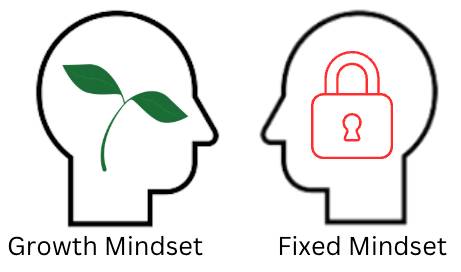Growth Mindset vs Fixed Mindset
"Mindset refers to our beliefs about the malleability of intelligence: whether it's largely fixed, or whether it can be developed" (Murphy xvi).
What is a Growth Mindset?
Renowned cognitive psychologist, Dr. Carol Dweck, describes a growth mindset as "the understanding that we can develop our abilities and intelligence" (Dweck 2008). In a growth mindset, people believe that their most basic abilities can be developed through dedication and hard work – brains and talent are just the starting point. This view creates love of learning and resilience that is essential for great accomplishment. Virtually all great people have had these qualities.
In contrast, in a fixed mindset intelligence is viewed as innate and not based in effort. In a fixed mindset, people believe their basic qualities, like their intelligence or talent, are simply fixed traits.
Teaching a growth mindset creates motivation and productivity in the worlds of business, education, and sports. It enhances relationships.

Strategies for Promoting a Growth Mindset
- Remind your students that making mistakes is a key component of learning
- Share your own struggles in the classroom or with your own research
- Allow students to retake at least one exam a semester or revise a large project
- Remind students that regardless of the discipline, the skills they
use are not innate
- For example, in your syllabus or on the first day of class you might tell students: "You are not a good or bad writer; writing is a skill we will work on developing and improve this semester."
- Reinforce and praise persistance and resilience, like students making the extra effort to ask questions during office hours.
- Scaffold your course design with process-based grading to assess student's effort
Have any strategies of your own you'd like to share? We'd love to see them, so send us a message at ftlc@gvsu.edu!
Additional Resources
Articles
Ahmed, S., & Rosen, L. (2019, January 18). A Growth Mindset: Essential for Student and Faculty Success. Faculty Focus | Higher Ed Teaching & Learning.
Dweck, C. (2015, September 23). Carol Dweck Revisits the “Growth Mindset.” Education Week.
Yeager, D. S., & Dweck, C. S. (2020). What can be learned from growth mindset controversies? American Psychologist, 75(9), 1269–1284.
Books
Dweck, C. S. (2007). Mindset: The New Psychology of Success (Reprint edition). Ballantine Books.
Murphy, M. C. (2024). Cultures of Growth: How the New Science of Mindset Can Transform Individuals, Teams, and Organizations. Simon & Schuster.
Websites / Videos
Project for Education Research that Scales - Stanford University initiative whose website highlights a Mindset Kit, a free set of online materials related to mindsets.
The Power of Believing That You Can Improve - TED Talk - Carol Dweck (10 min.)
A Study on Praise and Mindsets - overview of Dweck's work by Trevor Ragan (5 min.)
Mindsets: Understanding Motivation and Achievement - Carol Dweck (55 min. presentation)
The Incredible Benefits of a Get Better Mindset - Heidi Grant Halvorson (25 min. presentation)

